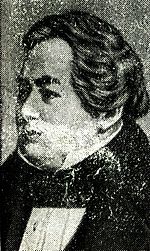- Osip Kozlovsky
-
Osip Antonovich Kozlovsky (also Joseph, Iosif Kozlowsky Russian: О́сип Анто́нович Козло́вский, also Иосиф or Юзеф Polish: Józef Kozłowski; (born 1757 Warsaw died March 11 [OS February 27] 1831), St Petersburg) was a Russian composer of Polish[1] or Belarusian origin.
Contents
Biography
For the most part of his life Osip Kozlovsky was attached to the Russian Imperial Court, for which he wrote most of his music. In Russia he became popular especially for his patriotic polonaises.
Born in Warsaw, he was a choir boy at St. John Cathedral. From 1775 he worked in Trakai at the palace of Tadeusz Franciszek Ogiński as a teacher of Michał Kleofas Ogiński (1765–1833) the statesman, rebel, and composer, known for his polonaise Pożegnanie Ojczyzny / Razvitannie z Radzimaj (Farewell to the Homeland).
He moved to Russia in 1786, where he became involved in the war against Turkey. He entered the army as aide-de-camp to Prince Dolgoruky. Soon he became known to Prince Grigory Potemkin, the prime minister (and accredited lover of Catherine II) between 1774 to 1776. Impressed by the musical talent of Kozlovski, Potemkin introduced him to the Court.
In 1791 he wrote the music for the unofficial Russian national anthem of the late 18th and early 19th centuries Grom pobedy, razdavaysya! (Russian: Гром побе́ды, раздава́йся!; English translation: Let the thunder of victory sound), text by Gavrila Derzhavin. The second part of this polonaise was later quoted by Peter Tchaikovsky in the final scene of his opera The Queen of Spades.
When the private theatre of Count Nikolai Sheremetev was transferred from Kuskovo to Ostankino, Kozlovsky’s opera (lyrical drama) Russian: Зельмира и Смелон, или Взятие Измаила — (English translation: Zelmira and Smelon, or the Capture of Izmail) to a text by Pavel Potemkin, was premiered on July 22, 1795. The famous serf soprano Praskovya Zhemchugova acted the role of the captive Turkish woman Zelmira. The opera was revived and performed again on August 28, 2004 at the same place in Ostankino.
Between 1799 and 1819 Kozlovsky supervised the theatre orchestras and the theatrical college at St Petersburg. Kozlovsky composed a famous Requiem Mass in E flat minor Missa pro defunctis for the death of Stanisław August Poniatowski, the King of Poland (1732–1798), commissioned by the King himself before his death and performed on February 25, 1798 in St Petersburg. He wrote another requiem for the death of the Emperor Alexander I. His considerable production included stage music for Edip in Afinakh (Oedipus in Athens, 1804), Fingal (tragedy by V. Ozerov, 1805), Tsar Edip (Oedipus Rex) (1816), Esphir (by Racine 1816), litugical music including the Te Deum, cantatas, choruses, songs (including 28 Russian songs), about 70 polonaises and other dance music for the Court balls, etc.
Tchaikovsky quotes a polonaise by Kozlovsky in the ballroom scene of Pique Dame.[2]
Quotations
- “Among the authors of the most popular Russian songs was a musician who didn’t have a single drop of Russian blood in him – Pole Osip Kozlovsky. However, he did spend a major part of his life in Russia, and, judging by his musical endeavors, succeeded in fathoming its essence…” (1000 Years: Russian song[dead link])
- "Prince Grigory Potemkin celebrated the grant victory giving a ball in his palace in St Petersburg which opened with a polonaise dedicated to Alexander Suvorov. One of Suvorov’s musically endowed officers, Osip Kozlovsky, was commissioned by Potemkin to write this musical dedication which he diligently did exactly on time." Music Tales: Military Music[dead link]
Recordings
- Music at the Court of St Petersburg, Vol. 2, Composers: Bortnyansky, Teplov, Kozlovsky, etc.; Performer: Iana Ivanilova; Label: Opus 111; Catalogue Number: OPS30179; Released: April 7, 1997; Audio CD DDD
The tracks include the following works by Osip Kozlovsky:
-
- Almen nel ciel pietoso (If only in merciful heaven)
- Polonaise, Pastorale
- Polonaise on a theme by Noccolo Piccini
- Milaya vechor sidela (In the evening, seated beside the stream)
- Polonaise, Fantaisie No 01
- Placiso zeffiretto (Gentle Breeze)
- I Long for You Constantly
- Please, Madam, polonaise (piano)
- I Want to Be a Little Bird (piano)
- Last Night My Darling was Sitting (piano)
- Ruby-Red Dawn is Already Glowing (piano)
- Where, o Where Can I Hide Myself (piano)
- Requiem in Latin and Salve Regina[3] (Реквием для солистов, хора и оркестра) - Galina Simkina, Lidya Tchernykh, Valentina Panina, Konstantin Lisovsky, Vladimir Motorin, Moscow State Choir, USSR Ministry of Culture SO, cond. Vladimir Yesipov. Label: Melodiya, ADD, 1988.[4]
References
- ^ David L. Ransel, Bożena Shallcross, Polish encounters, Russian identity, Indiana University Press, 2005, p. 83
- ^ Taruskin, R. On Russian Music
- ^ 1 Kyrie 6.05, 2 Dies irae 3.47, 3 Tuba mirum 5.42, 4 Judex ergo 7.18, 5 Confutatis maledictis 5.27, 6 Lacrimosa 4.00, 7 Domine Jesu Christe 8.01, 8 Sanctus 5.01, 9 Benedictus 7.10, 10 Agnus Dei 7.03, 11 Quia pius es 7.39, 12 Marche funèbre 3.18, 13 Salve Regina 8.48 Total Time 79.27
- ^ Cast list in Russian: Галина Симкина, сопрано; Лидия Черных, сопрано; Валентина Панина, меццо-сопрано; Константин Лисовский, тенор; Владимир Маторин, бас; Государственный Московский хор; Московский хор учителей; Хормейстеры: Виталий Тусеев, Алексей Рудневский; Художественный руководитель Андрей Кожевников; Государственный симфонический оркестр Министерства Культуры СССР; Дирижер Владимир Есипов.
External links
Categories:- 1757 births
- 1831 deaths
- Opera composers
- Russian composers
- Polish composers
Wikimedia Foundation. 2010.

